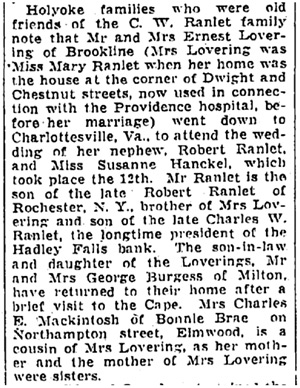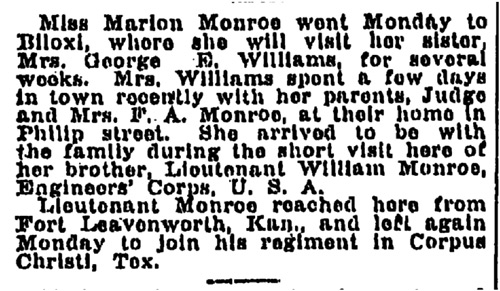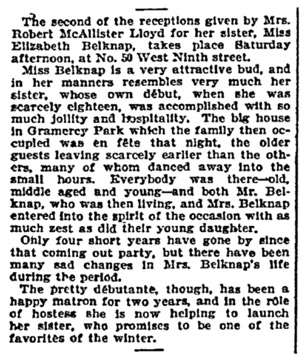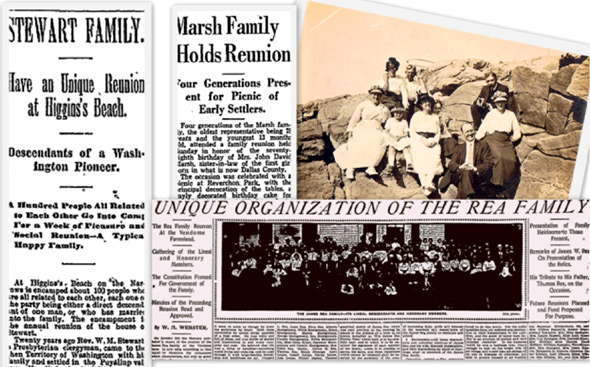The following article was written by my good friend, Tom Kemp:
Searching Newspaper ‘Local Briefs’ – Family History Gems that make Local Briefs Essential to your Family History Research.
Experienced genealogists rely on historical newspapers, tracking down obituaries, birth announcements and marriage notices to help fill in details on their family trees. However, many people don’t realize that newspapers provide another valuable resource for family history research, one that is often overlooked: the humble “local brief.”
These aren’t always about the next bake sale the local church is having—these short notices can turn up family details that appeared nowhere else in print.
Local Brief
Newspaper editors wanted to catch and keep their readers’ interest and attention. They did that by writing about their readers’ friends and neighbors, providing details about what was happening in their lives. In both small towns and big cities, readers were interested in their neighbors and in keeping up with how they were doing.
Key Family Information
Here is a good example. This is a typical “local matters” item of the sort that routinely appeared in newspapers around the country. This one appeared in the Aug. 28, 1917, issue of the Times Picayune (New Orleans, Louisiana). At first glance, it is just a simple article about a family’s visits:
Looking at it more closely, we see it has key family information. It gives us the following:
- Names of the family members
- Where they lived
- Various family relationships
- Brother’s military career
These are all great clues for piecing the family links together.
You’d be surprised how often these local briefs supply missing details about a family’s history. Don’t know what became of a relative, or whom she married, or where she moved to? One of these small notices can really come in handy, providing just the right clue you need to fill in a family gap that’s been stumping you.
“Society” Column
Many newspapers ran a “Society” column, in which the news tended to be about the more established, wealthier  families in town. Other newspapers labeled similar columns “Local Briefs,” “Personals,” “Chatter,” or “Social Events,” and tended to include notes on a broad sweep of the middle class.
families in town. Other newspapers labeled similar columns “Local Briefs,” “Personals,” “Chatter,” or “Social Events,” and tended to include notes on a broad sweep of the middle class.
Here is another good example. The “Social & Personal” notice was printed in the June 17, 1928, issue of the Springfield Republican (Springfield, Massachusetts):
Look at how much family history we learn from a simple announcement that a local couple travelled to attend a wedding in Virginia! For one thing, we learn both the married name and the maiden name (often a difficult fact to establish) of three different women. We glean many names and relationships from several different families, covering three generations.
The social notice posted below was printed by the New York Herald (New York, New York) on Dec. 25, 1898:
Here we get a glimpse into a little slice of this family’s life that would not appear in an obituary, birth announcement or marriage notice, yet tells us something real and concrete about their lives. These are the details that, unless an ancestor left you a letter or diary, can’t be found anywhere else. These are the family history gems that make local briefs essential to your family history research.
Family Reunions
Newspapers also routinely published news of family reunions. These can be filled with family details like:
- Names of first ancestors to settle in the area
- Favorite recipes
- Names of the oldest and youngest attendees
- Names of those that came the longest distances to be there along with the locations where they now live
- Favorite family stories
- Colorful relatives
- Details about the old family homestead, business or farm
- Family photographs or the old familiar etchings that appeared in 19th century newspapers
As you can see, it’s worthwhile to keep society listings, social and personal columns, and local briefs in mind when searching old newspapers—don’t just focus on the obvious obituaries, birth announcements and marriage notices.
This is one more reason why an archive of historical newspapers—such as the collection of over 5,500 titles that GenealogyBank features—is a gold mine of facts and stories, one you will mine again and again as you pursue your family history research.
Huge Historical Newspaper Archive at GenealogyBank.com
One of the key sources for online newspapers is GenealogyBank.com. By providing access to rare and hard-to-find newspapers from 1690 to the present day, GenealogyBank gives researchers the opportunity to discover unique, long-forgotten information about their American ancestors.
Featuring more than 5,000 U.S. newspapers with over 1 billion names from all 50 states, GenealogyBank is one of the most extensive online historical newspaper archives available anywhere, designed specifically for family history research. Over 95% of our newspaper content is exclusive to GenealogyBank.
Special Offer for GenealogyBlog readers – Join Now and Save 25%!
For a limited time, annual memberships are at their most affordable if you join before July 31, 2011. For only $4.37 per month, you’ll save over 25% off the annual subscription (Now $52.46 – Was $69.95).
You can also subscribe by phone 1-866-223-8535 (M-F 9am-5pm MST) and mention product code 1104LM. There’s never been a better time to explore your family history. You are just a few clicks away from fascinating facts and stories from your family’s past.
SAVE 25% and Get Unlimited Searches
In view of full disclosure, I have an affiliate relationship with GenealogyBank.com, of which I have been a member for a number of years. I personally love the site, and am proud to recommend it.



My favorite pastime is visiting the state archives and reading old newspapers on microfilm from my home county. Since my family arrived there in the mid 1800’s, I can find information from most any issue I read. I’ve been able to fill in the dates for births, deaths, marriages, etc. just by reading these newspapers. Relationships are spelled out in these brief messages. The Community columns are the best source of information. The columnists were paid by the length of the news — thus it was to their advantage to put in as many details as possible.
Some day, I hope to afford a subscription where I can search papers across the nation.
This article was very well written and brings to mind why newspaper research is so important. In the old days, it took a lot of time and reading to find un-indexed articles on one’s ancestors. Now with online databases like NewspaperArchives.com, it can be easy to find wonderful detail about one’s ancestors through this source. I have other newspaper collection sites indexed on my blog too.
One should always read the local comments in the same newspaper as a death notice/obituary as these will often mention those who came to town for the funeral. Also read subsequent issues as more comments may be found. Also, one can often trace what happened to an ancestor or other family member or find indications of participation in community activities. My grandfather ran silent movies at the local IOOF hall in the early 1900s and they are advertised in the paper. Other cultural situations can also be found. For instance, in searching for an obituary in a rural area in 1918, I ran on to a small article about the members of the local German Lutheran Church announcing to the pastor that he had to preach in English or leave. That year was one in which German immigrants found themselves being shunned due to WW I and those folks at the church likely wanted to be as American as possible. And the editor applauded the move. So READ those papers.
AMEN! I have hundreds of copies of “Vermont Tribune” a weekly out of Ludlow. I spend my long winter days transcribing the “local” items from these papers, all published over 100 years ago, and I send them to VT Rootsweb page. They give so much of genealogic interest and folks seem to enjoy reading them. Often a person who moved from VT will die “out West” and then be brought back to be buried here. If a descendant were to be looking for the burial near where they died they’d never find ’em. Besides, it’s FUN. Ruth